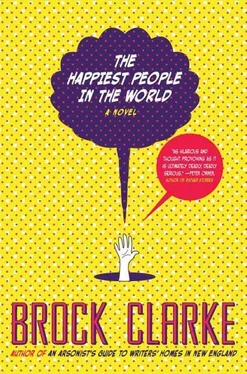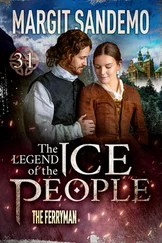She pulled around this guy, but she did not give him a wide berth, just to see what he would do. Sure enough, he gave her a look that said, Hey, what’s your problem, you almost hit me! And only after she’d pulled back into her lane and driven maybe a hundred feet farther did she recognize him as Matthew.
It was after eight at night when Henry returned to the Lumber Lodge. The tavern was full now — full of big people and the big sounds they made — but he didn’t join them. He was tired. Besides, there’d be time to join them on some other day, at some other hour. Odd: Henry didn’t know them but was already thinking of these Broomevillians as family, family being the group of people you look forward to spending more time with later.
Anyway, he waved to Ellen as he skirted the barroom, climbed the stairs to room 24. He turned the key and opened the door. The first thing he noticed was that the room, using the expression his students would teach him in the days and weeks and months and years to come, “smelled like ass.” The walls were painted dark yellow, and nailed to those walls were several faded prints of families being transported through the snow by horse-drawn sleighs. The carpet was yellow like the walls, and there were NO SMOKING signs everywhere, even though there were cigarette burn marks and holes in the carpet. The bathroom was visible from the rest of the room; the sink was white, but the porcelain was stained blue under the tap, as though the tap released not water but antifreeze. Henry sat down on the twin bed, which creaked and buckled but did not break. Home, he thought, and then he thought it might be easier to think of room 24 as a home if he turned the lights off. He did that. Then he got into bed, fully clothed, without taking off his contact lenses. Downstairs he could hear the big happy sounds of the big happy people. There was music playing, and the people were shouting to be heard over it, making both the music and the shouting unintelligible. Henry put his hands over his ears, but he could still hear the sounds — of the people and the music, but also of Ellen and Matty and Kurt and his cronies, and of the man on the bus and their singing, and Locs telling him to go to Broomeville, and Ilsa in Aarhus, and his editor in Skagen, and the man who’d burned down Jens’s house, and that strange man at the baseball game (Lawrence was his name), who had started talking to Henry in what was probably Swedish, and the people on the television and in the newspapers and on the Internet, talking about Jens’s cartoon, his death, whether it meant the end of something ( civilization, maybe) or the beginning of something, or whether it meant anything at all — all these sounds and voices and faces gathering around Henry, and he thought, If I were still a cartoonist, I would draw a cartoon of a man in bed with his eyes squeezed shut and his hands pressed over his ears surrounded by faces with their mouths open, little sad or happy or angry lines coming out of their mouths. But Henry wasn’t a cartoonist anymore. He was a guidance counselor, and in ten hours he had to get up and find out what it meant to be one.
He pulled the scratchy covers up to his neck and fell into a deep sleep, a sleep so deep that he didn’t even hear, three hours later, someone opening his door, didn’t sense her standing over him, breathing hard.
Generally speaking, to be in love is to be embroiled in an endless internal conflict between world-weariness and stupidity. I am in love, Locs thought, I have been in love before, I have been in love before with the same person, I know that that same person had been in love with me, and yet that love did not work out so well, that love ended up terribly, all love ends up terribly, why deny that all love ends up anything other than terribly, that is what it means to live in the world, it is so wearying to live in the world, this is why the world makes us weary, it makes us weary so that we’re too weary to love again, and yet the world also gives us another chance, and now I have another chance to see the person I love, because I still love this person, I still love this person so much, and since I still love this person so much, after everything that has happened between us, that must make this love different from all other loves that ended up terribly, including our own love that ended up terribly, that only seemed to end up terribly, because true love never really ends, love, love, love, love renews the world, it changes people, it changes the world, the world gave me the name Lorraine Callahan, but you gave me the nickname Locs, which is a terrible nickname, a nickname I should have loathed, but I loved it because you gave it to me, I loved it because I loved you, because love makes you act out of character, it makes you feel like doing things you never wanted to do before, it makes me feel like doing something ridiculously domestic, like tidying up this rental car, like it’s a home or something, please forgive the mess, my love, here, sit down, but first let me take this notebook off the passenger seat of my Chevy Cruze, the notebook I lifted from your son, who lifted it from your guidance counselor, a notebook that has, inside, an incriminating cartoon and also an incriminating Danish word, can you believe that that cartoonist could be so stupid, sweetie, to draw this cartoon and write this word in this language, sweetie, you look just as handsome as ever, sweetie, is everything all right, sweetie, why do you have that look on your face, sweetie, I haven’t seen you in so long, sweetie, but the last time I saw you, you also had that look on your face, you mean I came all this way just to see this same look on your face, Jesus, I’m so stupid, Jesus, I’m so weary.
“You’re wearing my hat,” said Matty. Because that’s really what he was. She wanted him to be a Matthew. But he would always be a Matty.
“Do you love me?” Locs asked.
“I really do,” Matty said. “But I just can’t.”
Locs didn’t listen closely to the rest of it. Matty wasn’t really saying anything he hadn’t said before. Locs stared out the windshield while Matty talked. It was still snowing. The snow made everything seem out of time; it was night, but as long as it was snowing like this, would the day look much different?
“I know this hurts,” Matty said. “But I also know that everything is going to be just fine.”
Locs was suddenly paying attention. “What did you just say?” she asked, and Matty repeated what he’d just said. Locs knew the words weren’t Matty’s. She was sure that he’d never said anything like that before in his life. In fact, even when he said, “Everything is going to be just fine,” his voice sounded tragic, like nothing would ever be all right again, like he desperately wanted to be saying something else.
“What did he tell you?” Locs demanded.
Matty didn’t even bother to pretend not to know whom she was talking about. “Henry said I knew how to make sure everything would turn out fine.” And then he repeated what he’d already said. “And the only way to make everything turn out fine is to let you go, once and for all. I need to stay with Ellen and Kurt. It’s the only right thing to do.”
Henry, Locs thought, hating him even more. “He said that?”
“In so many words.”
Somewhere in the distance, Locs could hear the roar and scrape of a snowplow. A minute earlier she would have wanted to throw herself into the path of that plow. Now she was thinking of throwing someone else.
“Please tell me what you’re thinking,” Matty said.
“I’m not thinking anything,” Locs said. In truth, she was thinking that she was going to kill that cartoonist. But that was an imprecise thought: she had actually never killed anyone. This was a common misunderstanding about secret agents: sometimes they protected people from getting killed, and sometimes they got people killed, but rarely did they do the killing themselves. No, Locs would not kill the cartoonist; she’d get someone else to do that for her. She would leave him something, though, just a little hint of the huge fucking disaster he’d made for himself. But first, she needed Matty to go away.
Читать дальше












